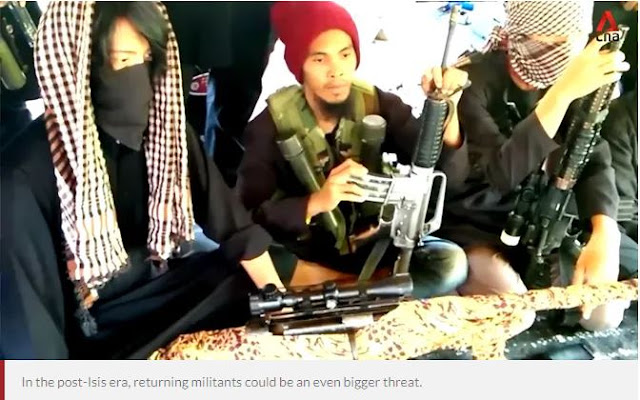ISLAMIC STATE FIGHTERS HEADING HOME: IS SOUTHEAST ASIA READY?
Roughly 1,000 Southeast Asians joined the conflict in Iraq and Syria. With the terrorist group’s military collapse, Insight examines whether they will rise again in their home countries.
By Desmond Ng
25 Jul 2019 06:15AM (Updated: 25 Jul 2019 08:17PM)
- PART I -
KUALA LUMPUR: It was the largest migration of foreign fighters seen in history.
Today, with the defeat of the Islamic State group, some experts believe that one of the biggest threats the world is facing is the return of the fighters.
Of the 41,000 people believed to have travelled to join the self-declared caliphate, an estimated 1,000 people were from Southeast Asia, some of whom have already returned to plot attacks in their home countries.
“If you see the fall of ISIS (Islamic State in Iraq and Syria) and say that we’re going to enter a peacetime period, (you’d be) wrong,” warned Ahmad El-Muhammady, a counter-terrorism analyst at the International Islamic University Malaysia.
People often make the mistake of thinking that once a terrorist organisation has been crushed, “it’s dead”. But its members would spread globally and could remain “hidden from the government radar”.
“We’re going through the hibernation period. We’re going to see another rise,” he told the programme Insight.
So is the region ready to deal with these returning militants? Will Southeast Asia be a fertile ground for this terror group’s resurrection?
"THEY’LL COME HERE"
The Islamic State was officially declared defeated in Syria in March, following years of military pressure from a 79-member coalition.
But with the terrorists’ failure in the Middle East, “they’ll come here” — a region with one of the largest Muslim populations in the world — said Mohd Farid Mohd Shahran from the Institute of Islamic Understanding Malaysia.
The ideology has the potential to take Southeast Asia, especially Malaysia and Indonesia. That the region is emerging as a terrorism hotspot is evidenced in the rise of terror attacks in several countries, including Indonesia, the Philippines and also Sri Lanka.
Last year, coordinated bombings in Surabaya killed 28 people (the perpetrators included), in the deadliest Islamic State-linked attacks in Indonesia so far. There were another 12 terrorist attacks last year, and 13 terrorist plots foiled by the Indonesian authorities.
In 2017, an Indonesian returnee killed a policeman in Medan, while in Malaysia, authorities foiled returnees plotting in 2015 to attack police stations and army camps. Malaysian authorities were reported to have also disrupted four terrorist plots and arrested more than 80 militants last year.
“While the region hasn’t yet seen a tide of ISIS fighters returning from Iraq and Syria, this threat could grow,” highlighted the Singapore Terrorism Threat Assessment Report 2019 by the Home Affairs Ministry.
TERROR LAWS, TACKLING SALAFISM
To deal with possible acts of terror following the rise of the Islamic State, Malaysia has adopted a no-nonsense approach. The Prevention of Terrorism Act 2015, for example, enables the authorities to detain terror suspects without trial for a period of two years. This has helped the authorities to prevent a terrorist attack from taking place.
The country’s laws also enable the police to arrest individuals for spreading what are deemed to be extremist beliefs.Last October, seven foreigners and a local were arrested for their links to a religious centre believed to be promoting Salafi jihadism, an ideology associated with Al-Qaeda. “If the Salafi jihadi teachings that influence some of the Islamic education centres in Malaysia aren’t controlled and the thinking isn’t corrected, it’ll become a threat in the long run,” said Farid. Some of those religious schools could become centres for these movements, which would “spread like wildfire”
So far, at least 11 fighters from the Middle East have returned to Malaysia. Records show, however, that more than 40 Malaysian fighters are scattered across the region, unsure if they can or want to come home. Such returnees, frustrated with their failure to achieve martyrdom with the collapse of the Islamic State, could attempt to continue their mission by staging suicide attacks in their homeland, Inspector-General of Police Abdul Hamid Bador warned in an interview last month.
Extremism in Malaysia is on the rise in general, pointed out El-Muhammady, “because of the residual of the post-conflict in Syria, the returning foreign fighters and the changes in political dynamics in the country and the region”.
Source: Channel New Asia – 25 July 2019
https://bit.ly/2Yq0XYx
https://bit.ly/2Yq0XYx
FOLLOW US 👇
https://facebook.com/alhaqcentre2020
https://twitter.com/alhaqcentre
https://instagram.com/alhaqcentre
"Together Against Extremism."




Comments
Post a Comment